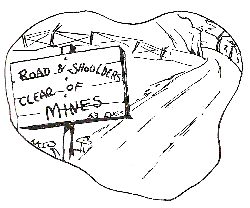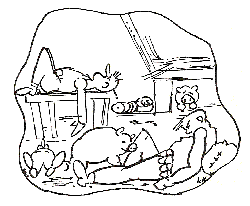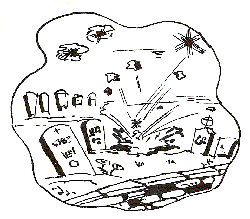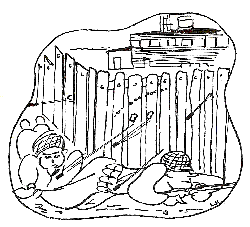| History - 49th A.I.B. - Company 'C' |
 | Index
|
| Index
| | Next |
| Next |
|
(Pages 12-15)
|
W E R E A C H T H E R H I N E |
|
About 1800 on 6th of March 1945, by order of our Battalion Commander, the company moved back into Rheim, Germany, only to be alerted to move out again at approximately 2030 to the vicinity of Rheinberg, Germany. C company was to be the advance guard and was to move out with the final objective being to take and
hold intact, a bridge over the Rhine at Wesel, Germany. We stood by, ready, part of the time mounted, half of
the time in the houses. We waited for the "ghost" orders of our battalion headquarters.
On the 7tn of March, ten hours after the initial alert, the march orders were finally received to move out to the vicinity of Winterswick, Germany. Captain Clark was to go forward and receive orders at Rheinberg. We moved out of Rheim towards the Rhine. We were like most forces, moving in the early morning. In most tracks, only the driver, car commander, and assistant car commanders were awake while the rest of the squad wrapped in blankets slept. Sleeping in a track is something most people would say they could never do, but it came very natural to most of us after a short time. It was no effortto sleep - - - it was an effort to keep awake. Several times,

|

Crumley and Lt. Ballinger came along the left side of the column and shouted to the drivers to 'close up to 30 yards' or, "keep your speed at five miles per hour". Still while the task force slept it moved. But we who slept trusted those awake just as they trusted us when they slept and we watched.
Tentative orders were received to move off the road and disperse the tracks in the vicinity of Winterswick. We stayed in the original march order, only moving off The road to the shoulders (cleared of mines). We dismounted, brought out the blankets, built fires and settled down to wait for a chance to move into Wesel. Waiting for the battle always seemed the hardest. At present, in Rheinberg and vicinity, approximately 10,000 German troops, remnants of the First Paratroop Army, the 116th Panzer Division and smaller German units were trapped in a triangular pocket on the Rhine's west bank, immediately opposite Wesel. It seemed imperative to the 'Jerries' that they hold the pocket at all costs to move more men and equipment to the other side of the Rhine; to regroup and reorganize for the defense of what now remained of the Third Reich. This we must say, they did.
|
-- 12 --

In the late afternoon of March 8th, we moved off the road and billeted just outside Rheinberg in a group of farmhouses. The tanks and half-tracks were dispersed in the surrounding orchards and barnyards.
After an hour of jockeying vehicles, equipment and personnel from one barnyard to another, we were finally moved into billets for what was left of the night's sleep. Many nights of badly needed sleep were lost this way. During the night, clouds gathered and about one o'clock in the morning (now the ninth) a steady rain started falling. Rain fell through the roof on us, some sleeping, some thinking, most all freezing on the grain piles. At 0430, we had breakfast and orders to move forward on foot. Tired men, prepared to move out. Chris and the kitchen had a hot breakfast that morning of pancakes, cereal and coffee. It was our first one :n four days but some had to miss it. When orders came to move out some were eating while the rest moved slowly ahead in the chow line.
In the late afternoon of March 8th, we moved off the road and billeted just outside Rheinberg in a group of farmhouses. The tanks and half-tracks were dispersed in the surrounding orchards and barnyards.
After an hour of jockeying vehicles, equipment and personnel from one barnyard to another, we were finally moved into billets for what was left of the night's sleep. Many nights of badly needed sleep were lost this way. During the night, clouds gathered and about one o'clock in the morning (now the ninth) a steady rain started falling. Rain fell through the roof on us, some sleeping, some thinking, most all freezing on the grain piles. At 0430, we had breakfast and orders to move forward on foot. Tired men, prepared to move out. Chris and the kitchen had a hot breakfast that morning of pancakes, cereal and coffee. It was our first one :n four days but some had to miss it. When orders came to move out some were eating while the rest moved slowly ahead in the chow line.
As we stood in the darkness and rain waiting to move, a reverse order was received. We returned to our tracks, turned 'em' over and moved into Rheinberg. We dismounted again at Rheinberg. It must have been here that the original plan of securing the Wesel bridge for the Rhine crossing was abandoned. Rheinberg had been taken at a high perhaps unnecessary cost by the 36th Tank Battalion and now we were preparing to move out dismounted in conjunction with the 35th Infantry Division to take Ossenberg,
|
a town which was still in enemy hands twenty-four hours after it was scheduled to have fallen. That's the way with war,
it knows no schedule.
We moved out of Rheinberg on foot, attacking along a left fork of a road running through Ossenberg, with the 35th on our right and B company of the 49th on our Jeft. C Company was to take the final objective, a triangular piece of woods just north of Ossenberg. We moved slowly along the road, through intermittent artillery fire and on out of Rheinberg. There, just at the edge of town, we turned around for the first of three times and moved back into Rheinberg. There was no enemy small arms fire or signs of resistance,
we just moved back. Artillery was increasing however, and the third time we moved out, many oaths were
muttered. Again we moved over the same road. The first and third platoons were on line, the second and
anti-tank in reserve. We moved along the road side, stopping now and then passing back commands. Russ
Gaskill was killed along this road. An 88 hit the second story of a building and he was caught in the burst.
Originally, the company was to by-pass a factory zone to our left. The factory was supposed to have a thick stone wall but in reality it was a fence of thin wooden slats. Our left flank was now exposed. Snipers in the factory held their positions unknown to us and we moved along walking almost upright. Then
the order came down to start working in Able, Baker, and Charlie teams and clear the houses on the right. No information was available concerning the enemy. It was easily visible though, that fighting had already
occurred in the area. Silent "Jerries" told us that. To what extent the Germans had pulled out, we didn't know.
The first platoon was now drawing fire on the extreme right and the anti-tank platoon was caught by mortar fire in a gully just to the right of the factory. The anti-tankers left the gully in rushes seeking cover in a house to their immediate front. Keller, Montague and Gool were wounded here. The third platoon was moving along the factory wall while the second platoon had moved through to clear the houses. Patterson's squad brought back the first prisoner catch of the day from the last house. The third platoon and the anti-tank moved up along the left, crossed the intersection and continued clearing houses. The company took its immediate objective, the houses and road intersection north of Ossenberg. We were told we might find friendly troops there, which handicapped our operations, making us hold our fire until we were actually fired upon. We were ordered to wait at the intersection until elements of the 35th were with us on the right and B company of the 49th was on the left. Contact was made with the 35th at about 0900 and information exchanged by
the "old man" as to plans. The line platoons moved into the houses surrounding the intersection and waited.
|
-- 13 --

Artillery fire increased and by noon it was coming in almost without interruption. B Company came up at 1530, jumped off, and cleared their objective. C Company now passed through B Company under enemy artillery and mortar fire. The third platoon was on the left of the road, the second platoon on the right and the first platoon in reserve with anti-tank. The third platoon had a partially protected route from small arms fire. They moved by the cemetery and reached the edge of the field almost fifteen minutes before the second moved into position. The third platoon deployed formed a line of skirmishers with Hamilton's, Roger's and Stanley's squads on line. Chisholms's and Watz's squads and Lt. Kimpel were in support. The order 'fix bayonets' was given in preparation for an advance across the field to clear foxholes. Roger's squad on the extreme right was warned by friendly troops occupying a barn at the corner of the field that they would be vulnerable to enemy fire from the right flank if they moved out. Contact with the 35th had been lost, but it was believed that they were moving on the woods southeast of our objective. The second platoon moved up in the direction of the stable, but at this point the automatic weapons on the right flank opened up, pinning down the third platoon. The second
continued to advance under fire.
The third platoon instead of being pulled back dug in. Harmon and Carswell on the extreme left were wounded by sniper fire. Phipps and 'Red' Batchelor in a rush across the open ground under sniper and
automatic weapons fire removed Carswell. The third platoon continued digging in and prepared to hold. The first platoon was pinned down while trying to move up to a better supporting position. Lt. Lybrand thoughtfully held up on the edge of the cemetery. There was no cover from here to the final objective which was some 500 yards away. The foxholes dug by the 'Krauts' before our arrival were put to good use and disregarding the past warnings and experiences with 'schu' mines
|
we dove into them on the first burst of 88 fire. At the point of the platoon Roggenbach, Noeske, and Lybrand and a 300 radio all crammed into one foxhole and found plenty of room when the
'Krauts' opened up with mortars, 88's, 20mm and rifle fire. The cemetery took on a new meaning now, and as so many times before we put our trust in God. The platoon remained here until dark and after the intense fire had subsided, half of the men moved forward under the blanket of darkness to their immediate objective. Covey, while standing guard at the C.P. was killed by shrapnel shortly after dark by a direct hit.
The second platoon during all this action advanced to the stable, took positions and opened up on the exposed right flank. Pierce was wounded and Lipp was killed on this approach march. Mike Mulhern established the initial base of fire by placing his light machine gun on a window ledge, firing and feeding it from the hip. Dick's mortar squad moved into support and Zimmerman began bracketing in. The 'old man' was advancing with the second platoon at this time and he called for two tanks and a squad of infantry to move in the direction of a hedgerow on the right, where the enemy was seen digging in. The tanks were supposedly in
our support but it was now disclosed that they were in the B Company area several hundred yards to the rear. Tauck was sent to secure a section of tanks to place in position prior to the assault on the hedgerow. Only one came forward at this time and Biagini's squad supported by this tank pushed off in the attack. Heavy small arms fire developed and Barbieri, Tavares, and Gasick were casualties. The tank was knocked out by bazooka fire. The squad was withdrawn to the cover of the buildings and the wounded evacuated due to the action of Marshall and Tavares. Heavy artillery fire plus the continued small arms fire from the right flank, made it almost impossible to cross the open field until the 35th Infantry, had taken the small woods on our right flank. It was thought advisable to stand-fast because in order to successfully attack the enemy, we would have to maneuver into the 35th's zone of action.
Valuable lessons were learned the next few days; two never to be forgot. Tanks will draw fire and do not do piece work. A half a dozen tanks one by one tried to creep up to our support while we held the
perimeter defense. All six were knocked out by enemy positions on the right. It wasn't a nice sight to see the tanks hit and burning.
|
-- 14 --
|
The company now stopped, reorganized, and prepared to hold. All through the night and the next day, artillery fell constantly on the houses and fields, many of the buildings receiving direct hits. During the night, the knocked out tank by the hedgerow had been recovered. We were now in houses and here we sweated it out for twenty six hours, constantly asking for artillery which was refused, and air support which took too long to arrive. Finally, counter-batter artillery support was given the afternoon of March 9th, the same afternoon the woods were also skipped bombed by the air force. Just after dark the company dug into new positions and then we started the two hours on, two hours off foxhole watch. At 2200 that night the company received orders to occupy the woods by 0100 March 10th. By that night enemy artillery had decreased to almost nothing and no enemy activity could be seen in the woods.
At 2400 a patrol consisting of Maberry, Rogers, Hamilton, Freeburg, Clark, Duke, Cwek, Carr, Ford, Wiegartner, Erickson, Thompson, Phipps, Batchelor; Pogwizd, and Jay was ready and they moved out past the I. P. and into the blackness of the night. They moved silently across the field, stopping once to watch and listen. Then they moved on past the projecting corner of the woods and prepared to enter it from the rear. The patrol stopped again about thirty yards from the trees, which were occasionally silhouetted by the burst of enemy fire.
|
Word came back to the C. P. located in the basement of the last house, that half of the patrol was moving forward and half waiting. Still all was quiet. Several minutes later the forward half reappeared and motioned the rest of the patrol into the woods. They seemed to be unoccupied. The body of the patrol moved in, mortar rounds (perhaps our own) fell in the vicinity and everyone hugged the ground. Time passed. Back in the woods a line of skirmishers was formed and after some difficulty the woods were
screened. We moved a little less cautiously now and talked a little more even yelling at times to keep contact. At 0100 the woods were considered checked and radio word was sent back to move the company forward. A half hour later the bulk of the company moved into the woods and dug in. For some it was the fifth foxhole in two days.
The next afternoon we withdrew to the houses. It was rather different this time, the battle was over and as we walked back across the fields and into the setting sun we were in groups of five or six. We
enjoyed the houses more at that time than the nights earlier in the week. 'Hamp' Clark, 'Pappy' White and Harrison Holt brought up our bed rolls and back mail from Rheinberg. We had a chance to wash now and catch a little uninterrupted sleep. Once during the night a few shells came in but this time their batteries were on the other side of the Rhine.
|
-- 15 --
|